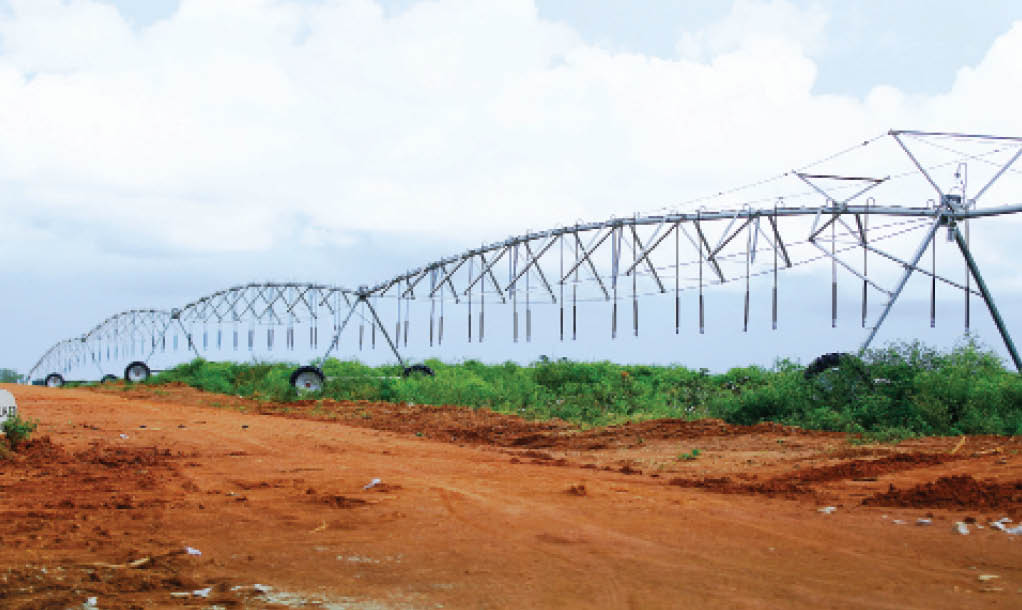Why FG must start preparation for dry season farming now
One of the major problems of the Nigerian agricultural sector is the late preparation for production seasons. Interventions usually come to smallholder farmers late at the time their crops have suffered damage or stunted growth. In November, farmers are expected to begin dry season cultivation, but the cost of inputs and insecurity may be challenges […]

One of the irrigation facilities in the country
One of the major problems of the Nigerian agricultural sector is the late preparation for production seasons. Interventions usually come to smallholder farmers late at the time their crops have suffered damage or stunted growth.
In November, farmers are expected to begin dry season cultivation, but the cost of inputs and insecurity may be challenges for them.
In May, during the sixth regular meeting with the president, the Chairman of the Presidential Economic Advisory Council (PEAC), Prof Doyin Salami, in his presentation, noted that only two per cent of the country’s cultivated land was under irrigation system despite huge potentials.
Prof Salami, therefore, advised the federal government to incentivise the private sector to encourage more participation.
In his reaction, President Muhammadu Buhari promised to give attention to the development of irrigation facilities across the country in order to inspire many Nigerians to invest in agriculture.
He said, “We need to go back to the land. Technology is doing away with petroleum, but we are lucky we have other resources: gas, vast arable land, which we are not using enough.”
Throughout the country, irrigation facilities have been in bad shape; dams have either collapsed or have not been desilted for many years; leaving irrigation projects such as Bakolori, Jama’are, Gurrara, etc. that hitherto were booming with activities shadows of their former selves.
Speaking last week during the handing over ceremony to the new Minister of Agriculture and Rural Development, the immediate past minister, Alhaji Mohammad Sabo Nanono, said the president had approved N600bn for smallholder farmers for the wet season, but that till date the ministry was battling to get the money released.
Alhaji Muhammad also said the president approved N3,000 per bag of fertiliser for smallholder farmers, but that the farmers did not get it even when the wet season was now approaching its end, and that harvest has begun in earnest for some crops like maize which needed fertiliser abundantly.
Alhaji Nanono then said, “I hope the money is released so that farmers can get it.”
He further said, “We have a huge responsibility in this ministry and everybody is looking up to this ministry because a small increase in food price will trigger negative response to the federal government.’’
Last season, an attempt to embark on massive dry season maize production for 200,000 farmers under the auspices of the Maize Association of Nigeria (MAAN) and the Central Bank of Nigeria (CBN) in 22 states did not see the light of day.
Today, there are many factors that affect wet season production which have made it necessary for the federal government to direct energy and resources to dry season farming.
Some of the factors include rising demand of maize by feed industries and household consumables, draught and flood.
Dr Bello Abubakar Funtua, MAAN president, speaking on maize production for last season, said, “Maize production declined from 12.6 million tons in 2019 to 12.4 million tons in 2020, representing a 1.55 per cent reduction arising from rainfall deficit (prolonged dry spell) in the South West and some parts of the South East, flooding in some parts of the North East and North West and inadequate fertiliser application on maize farms.”
Preparations for farming seasons have always been late which is why impact of government intervention is hardly felt.
“If the federal government wants to make any serious impact in meeting food demand in the country, dry season production must be encouraged. We have many dams and irrigation sites in this country, but they are either abandoned or are in poor condition. In developed agriculture, production is mostly through irrigation. But here, we depend on rain-fed, and climate change is affecting production,” a Kano farmer, Mohammed Hassan, said.
“Look at the abandoned irrigation project in Rano, Kano, if that project is completed, you cannot quantify the contribution of that site because there will be farming all-year-round,” he added.
Most farmers said if the federal government decided to focus adequately even on just three crops: maize, rice and tomatoes, for the dry season, it would change the supply curve and dynamics, but that preparation must start months ahead.
“Now if you go to the ministries of agriculture at the state and federal levels you will not see any preparation even though dry season farming begins in the next two months,” Alhaji Aliyu Hunkuyi, a retired extension officer, said, adding that the states were not doing much in agriculture.
Therefore, to prevent food crisis, government must redirect massive effort to dry season food production in order to meet the demands of key industries and local food consumption.
